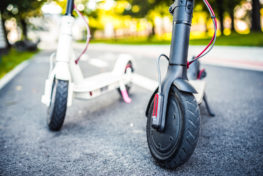While electric scooters offer fun and inexpensive transportation in downtown San Antonio, riding an e-scooter comes with responsibilities. In addition to following all scooter safety measures, riders need to know San Antonio’s local laws governing e-scooter use.
San Antonio officials tightened electric scooter ordinances last summer after what was criticized as a “light touch” on enforcement of scooter violations since their arrival in town a year earlier, the San Antonio Express-News says. It’s dangerous for scooter riders to start down the street on these motorized vehicles without understanding how they are supposed to be used.
A study in Texas found that 20 individuals were injured per 100,000 e-scooter trips during the study period. Of 190 injured riders, nearly half (48%) had injuries such as fractures or abrasions to the head. Over a third (35%) of the injured riders sustained a bone fracture.
Scooter accidents can cause injuries to pedestrians and bicyclists. Electric scooter users who do not follow the law and cause accidents can expect to be held accountable for the injuries and losses of those they harm.
What is Considered an Electric Scooter?
An electric scooter is a two-wheeled device that has a floorboard designed for the rider to stand upon while riding. An electric scooter is designed to transport one person at a time and has a rechargeable electric motor that can power it to speeds up to about 15 mph.
“Dockless” electric scooters are rented through a smartphone app. Once the rider is finished, he or she can leave the scooter parked anywhere within a defined geographic service area. Teams of contractors hired by scooter companies retrieve the vehicles with the help of GPS devices each night to recharge them and re-deploy them for use the following day.
The City of San Antonio first allowed more than 14,000 electric scooters on city streets as a pilot program in 2018. Electric scooter companies, such as Bird and Lime, have typically deployed fleets of scooters in urban areas unannounced, leaving city leaders to play catch-up to a growing local fad.
In September 2018, the first known death of a dockless electric scooter rider in Texas was recorded in Dallas.
 By June 2019, more than 2 million e-scooter rides had been taken in San Antonio, according to the Express-News. More than 155 people had been injured in scooter accidents, according to San Antonio Fire Department records. The records include only calls to 911 and do not include lesser injuries handled by 24-hour emergency clinics. There were undoubtedly more scooter accidents and injuries than the records reflect.
By June 2019, more than 2 million e-scooter rides had been taken in San Antonio, according to the Express-News. More than 155 people had been injured in scooter accidents, according to San Antonio Fire Department records. The records include only calls to 911 and do not include lesser injuries handled by 24-hour emergency clinics. There were undoubtedly more scooter accidents and injuries than the records reflect.
Electric Scooter Laws in San Antonio, TX
The San Antonio City Council amended local ordinances addressing the use of “motor-assisted scooters” and electric bicycles in May 2019.
Under San Antonio law, electric scooter riders:
- Must be at least 16 year old.
- May not have any passengers.
- Must obey all state and city traffic laws.
- Must always yield to pedestrians.
- Must use bike lanes when available.
- May not use a cell phone or portable wireless communication device while operating a scooter.
“The wearing of a helmet is encouraged but not required,” the ordinance says.
Under the ordinance, riding on sidewalks is prohibited in certain circumstances. But, in the absence of a bike lane, riders may ride on streets that have a speed limit of 35 mph or less and on sidewalks, including sidewalks adjacent to roads that have a speed limit over 35 mph.
On a sidewalk, riders must maintain a distance of 2 feet from all pedestrians.
Scooter riders may not ride on trails, creek ways, plazas, and parks, including the Riverwalk, Alamo Plaza, La Villita, Main Plaza, and Market Square.
But scooter riders may ride on public streets and sidewalks that intersect parks and plazas.
Violation of San Antonio’s e-scooter ordinance is a class C misdemeanor punishable by a maximum $500 fine, though a warning is a more likely result.
Scooter rental companies typically instruct riders to wear helmets and stay off sidewalks.
In May 2019, the Texas Senate voted to ban scooter riders from sidewalks statewide, but the measure did not emerge from a House committee and did not become law.
Under Texas law, riders do not need a driver’s license, registration, or insurance to operate an electric scooter.
In December 2019, the San Antonio City Council lifted a ban that had prevented scooters from operating between 11 p.m. and 6 a.m., which had been in effect since the previous February. The ban was not popular with Council or scooter companies, John Jacks, director of the Center City Development and Operations Department, told Texas Public Radio.
At the same time, the Council awarded three exclusive electric scooter contracts to Bird, Razor, and Lime, which took several companies’ scooters off of city streets and reduced the total number of scooters in San Antonio to 3,000.
How a San Antonio Motor Vehicle Accident Lawyer Can Help
 Anytime a person in San Antonio is injured in an accident caused by someone negligently operating a motorized vehicle, the injured individual has a right to seek compensation for their losses. At Herrman & Herrman P.L.L.C., in San Antonio, our experienced personal injury attorneys help those who have been unjustly injured by others’ negligence pursue compensation for medical expenses, lost income, pain, suffering and more.
Anytime a person in San Antonio is injured in an accident caused by someone negligently operating a motorized vehicle, the injured individual has a right to seek compensation for their losses. At Herrman & Herrman P.L.L.C., in San Antonio, our experienced personal injury attorneys help those who have been unjustly injured by others’ negligence pursue compensation for medical expenses, lost income, pain, suffering and more.
If we handle your personal injury claim, we can handle your automobile property damage claim free of charge. We will take care of the vehicle damage appraisals, the paperwork, and the negotiations with the insurance companies, so you can stay focused on your health.
Contact a San Antonio scooter injury lawyer at Herrman & Herrman at (361) 882-4357 today or online. We handle personal injury cases on a contingency fee basis. That means you will not pay any legal fees unless we obtain money for you.
The post Understanding San Antonio Electric Scooter Laws appeared first on .
from Herrman & Herrman, P.L.L.C. https://www.herrmanandherrman.com/blog/understanding-san-antonio-electric-scooter-laws/
via https://www.herrmanandherrman.com

 By June 2019, more than 2 million e-scooter rides had been taken in San Antonio, according to the Express-News. More than 155 people had been injured in scooter accidents, according to San Antonio Fire Department records. The records include only calls to 911 and do not include lesser injuries handled by 24-hour emergency clinics. There were undoubtedly more scooter accidents and injuries than the records reflect.
By June 2019, more than 2 million e-scooter rides had been taken in San Antonio, according to the Express-News. More than 155 people had been injured in scooter accidents, according to San Antonio Fire Department records. The records include only calls to 911 and do not include lesser injuries handled by 24-hour emergency clinics. There were undoubtedly more scooter accidents and injuries than the records reflect. Anytime a person in San Antonio is injured in an accident caused by someone negligently operating a motorized vehicle, the injured individual has a right to seek compensation for their losses. At
Anytime a person in San Antonio is injured in an accident caused by someone negligently operating a motorized vehicle, the injured individual has a right to seek compensation for their losses. At